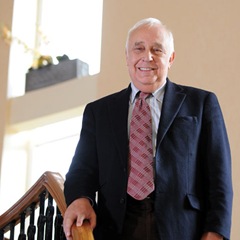Robert Skidelsky interview: deficit dissent
 Leading Keynesian economist Robert Skidelsky spoke to Owen McQuade about cutting out wastage in government and how any savings should be spent on capital investment, “the seed corn of the future.”
Leading Keynesian economist Robert Skidelsky spoke to Owen McQuade about cutting out wastage in government and how any savings should be spent on capital investment, “the seed corn of the future.”
In Robert Skidelsky’s view, it is much too early to cut the deficit and the wrong comparisons are also being made.
“Saying we need to cut the deficit is a false analogy between individual households and government,” he remarks. “The Government rarely needs to cut a deficit especially when the economy is in a slump.
“In fact, it needs to increase its deficit in those circumstances to make up for the lack of private sector demand. That’s what keeps the economy going when it has a big shock. So cutting the deficit is wrong.”
People “gear up” to thinking that this is the only possible approach but, while he disagrees with that path, there is one “justifiable” complaint: waste.
“When there is concentration on the deficit, they start looking at how much government expenditure is wasteful. That is also an analogy with households. They can always do without something,” Skidelsky adds.
“Certainly cut out bureaucracy but don’t cut the total deficit. Redirect from current spending to capital spending. Capital spending is the seed corn of the future.”
Skidelsky has just spoken at the Northern Ireland Economic Conference, and heard presentations on restructuring the regional economy and improving productivity. As capital spending in education and new technologies is needed to achieve that, the alternative is “catastrophic”.
Again, he understands how this happens as there are “so many entitlements” in recurring expenditure and therefore cutting the capital budget is easier.
Markets and government
Skidelsky has written much about the balance between government and markets. He does not expect a drift back to a more free market world with less government intervention: “No, we will not drift back. Governments will become more important but that doesn’t mean they will become larger. I think they have got to be smarter and more nimble but, of course, they will intervene.”
The regulation of financial services is one area in particular where there can be no going back.
“A lot of our trouble was because [banks] were freed from effective regulation such as the repeal of the Glass-Steagall Act,” he states. “They were free to develop derivative instruments which many didn’t understand and landed them with assets which turned out to be highly toxic. There is going to be a lot more control in that area.”
Skidelsky surmises that once an economy is in a hole, there is no doubt that it is quite hard to get out.
“The numbers become frightfully big and an opposition to large government recovery packages tends to grow over time,” he says. “So it is better to try and prevent economies falling over. To do this you need to go to a more active macro-economic management. Mandates of central banks should include the level of output and employment.”
He suggests that a different kind of target is needed, perhaps to maintain a steady rate of nominal GDP growth which includes both prices and output.
Government, in his view, has to be responsible for a greater share of the investment in the economy but not necessarily through public ownership.
“It could be done through an extension of public-private partnerships,” he says. “Somehow the Government has to guarantee there will be enough steady investment in the economy in order to prevent these huge slides in private investment which are always possible because of the uncertainty which the private sector faces.”
Keynes’ biographer
Robert Skidelsky’s three-volume biography of John Maynard Keynes (1983, 1992, 2000) has received numerous prizes and is seen as the definitive work on the economist’s life. He also lived in Keynes’ former house for 20 years.
Work on the first book started in 1978, “just the time when Keynes started sliding out of fashion.”
Skidelsky recalls: “Although he was out of favour, there was a strong interest in him as a personality. My book was heavily biographical, and I tried to paint a portrait of this genius as a human being and I think people liked that even though they didn’t like his policies any longer.”
The last volume carried on to his death and looked beyond it, and came out at a time when interest was reviving. The USA was in deficit and “people were thinking about another Bretton Woods” – the world monetary conference in which Keynes was involved.
“I thought I had finished with Keynes and done my duty by him and I would move onto other things,” he continues. “But then you had the great recession and almost immediately a publisher came to me and said: ‘Keynes is back. How about writing something?’”
The resulting book, ‘The Return of the Master’, was written in three months and demand has been so great that it is being translated into 15 languages, except in France “where they hate Keynes.”
Skidelsky is currently writing another Keynes-related book with his son, a philosopher, entitled ‘How much is enough?’ It will focus on Keynes’ moral outlook on economics, especially his essay ‘Economic possibilities for our grandchildren’.
Within that, he explains, Keynes asked the questions: “What is wealth for? What are we here for? And what is the correlation between economics and ethics?”
“So that’s another Keynes-related project. I’m never going to be shot of him,” he jokes.





